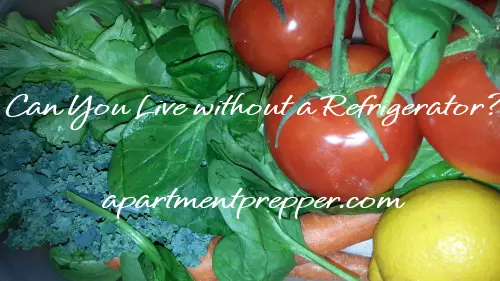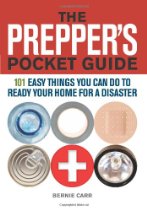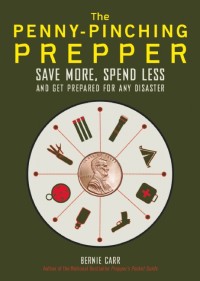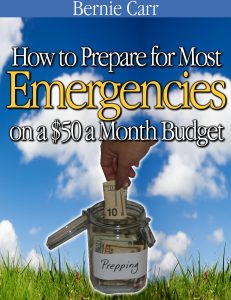This post is by Bernie Carr, apartmentprepper.com
Having a refrigerator in the house is one of those conveniences that we take for granted. Most homes and apartments come with a fridge, and if it didn’t, most everyone would get one right away.
Why even consider living without a fridge?
- Long term power outage
- Personal emergency: your fridge breaks and you can’t afford another one right
- Living in a downsized space such as boat or RV. Many boat and RVs have very small refrigerators
- Extended camping trips
I experienced first hand not having a fridge available when our fridge broke. The old fridge was about 30 years old; my parents gave it to us when they upgraded, and it finally gave out. The repair estimate came out about equal to just buying a new fridge. At the time, we did not have the finances to buy a fridge outright as we did not want to buy one on credit, so we waited until the next paycheck.
That meant not having a fridge for a few weeks. After the initial panic – who even lives without a fridge in this day and age – we decided to be creative.
- We transferred the most perishable items from the broken fridge to a cooler.
- We started researching what items absolutely need to be kept cool and which ones can last without refrigeration.
After three weeks the new fridge was delivered, but the experience taught me a few things.
Here are a few tips I learned:
Fruits
The shelf life of fruit depends on when the fruit was actually picked, and how ripe it was when you bought it. Many fruits last a long time without refrigeration: apples and citrus fruits will last around four to five weeks on the counter.
If you buy pineapples and mangoes, let them ripen on the counter for about three to four days, then eat within 24 hours. I don’t refrigerate bananas but let them ripen on the counter and eat them before they get too spotty.
Strawberries and other berries are short-lived without the fridge – eat them as soon as you buy them; if you must keep them, eat them the next day.
Vegetables and herbs
Some vegetables such as celery, broccoli and cauliflower will stay fresh when stored upright in some water.
Herbs also store well while sitting upright in water.
Root crops such as potatoes, sweet potatoes, onion, garlic will last one to two months without refrigeration. But once you cut into the onion, you need to use it right away.
Squash such as zucchini will last a week.
Tomatoes (technically a fruit but considered a vegetable for cooking purposes) will last two weeks if they are still green, or about a week at the most if they are already ripe.
The best way to ensure that fruit and vegetables stay fresh the longest without refrigeration is to buy them from the grower or at a farmer’s market, since you know they just got harvested and were never refrigerated in the truck or grocery store.
Milk
Use powdered milk and just prepare a serving or two for consumption. Another choice is to use shelf stable milk.
Juice
Apple juice will last a couple of days but most other juices get rancid quickly if not kept cold. Another choice is to use Tang Orange Drink, or powdered lemonade, and just make enough for use.
Eggs
As we have covered in the blog, eggs actually last a long time on the counter, and if you coat them with mineral oil, they will last for months.
Yogurt
Yogurt will last on the counter overnight but no one really wants to eat warm yogurt so we kept yogurt in the cooler.
Cheese and butter
Cheese and butter, because of the salt content, will actually last a week to two weeks outside the fridge.
Meats
Use canned or dehydrated meat. Unfortunately, fresh meat won’t last without refrigeration, so we kept the meats in the cooler.
Medications
Some medications such as certain children’s liquid antibiotics require storage in a cool area – these would have to be kept in a plastic bag (to avoid spills) in cooler.
Condiments
Most of the condiments such as ketchup, mayonnaise, mustard and hot sauce (Tabasco) that are in squeeze bottles last for a long time without the fridge. James and jellies also kept very well. During our time without a fridge, we just kept them in the pantry and they were fine.
The parts that weren’t so easy
The one thing about not having a fridge is you can’t have leftovers, so you can only cook limited quantities that the family will finish right away. Another thing that was not easy is not having cold drinks readily available, but that is something that one can get used to.
Truthfully, I really like having a refrigerator and would not willingly give mine up. But the experience of going without one taught me it is doable and in an emergency, I’ll know what foods to save and what to use up right away.
Interested in learning more? Check out this post on food storage supplies, companies, and ideas.













I have never refrigerated potatoes. Take them out of the plastic bag and put them in a wicker basket so they can breathe and they should keep for at least a couple of months. ( If a few are kind of shriveled at the end they rehydrate nicely in stew).
Yes, potatoes do last very well-good idea about the wicker basket! Thanks Susanne!
I read about something called a jeer pot. It is more or less two unglazed pots and some wet sand. Works best where the humidity is low. Keeps things cool, but not a real replacement for a refrigerator.
Hi olivia, Yes, I had read about the 2 pots with sand in between. Sounds interesting to try – I may have to run an experiment. We live in a humid area, so it may not work for too long. Thanks for the comment.
Very good food for thought. Thank you.
I have what I call my “whine cellar”. It’s an unheated room on the lower floor of my house that naturally stays cool. I open a window at night to let it receive cool night air and then close the window in the morning. In the last 2 years its maximum temperature never exceeded 70F. Usually it remains at about 58F. I keep store-bought plastic wrapped cheddar & jack cheese, and plastic tubs of “buttery spreads” in closed cabinets (no light) in this room. Cheese becomes more “sharp” with time (that’s good). Buttery spreads remain unchanged – even after 12 months. I’m now testing storage of store-bought unsalted butter cubes in vacuum packed 1/2 pint jars.
Regarding left-overs. Make big batches of foods you like and then can the leftovers in small containers. Pressure canning can be done if needed using small containers in many pressure cookers.
Hangtown Frank
Hangtown Frank
Hangtown Frank, That is great info- good idea on canning leftovers too. Let us know how the unsalted butter cubes turn out. Thanks for the comment.
Don’t over look the use of a butter crock in hot weather. These help keep your butter firm and cool. It will keep without one but is nicer. I have gone year at a time without refrigerator using a spring box instead.. The buy it and eat it rule is why many 3rd world countries shop daily for food.
Hi Fixit, Thanks for the butter crock idea. Good to know!
I canned 21 pints of butter; I haven’t eaten any yet.
I read the texture is a little grainy, but I can live with that to have butter on my toast, and in my mashed potatoes and rice.
Have never found home canned butter to be grainy. We water bath it and at 3 years old taste like fresh.
Hi Fixit, Have not tried home canned butter – glad to hear it taste like fresh. thanks for the comment!
Forgot–shelf stable milk(Gossner Farms). L have shelves of this milk.
My earliest ‘best by’ date is Jan., 2013. So I purchased months before that.
Yes, it lasts waaaay longer than 7 months as suggested. I chill the night before and have never had soured, spoiled milk yet!!!
Jayjay, that’s great to know about shelf stable milk-thanks!
Excellent article. Very informative.